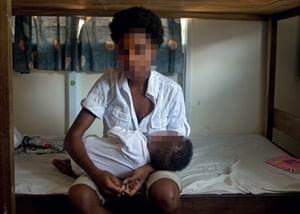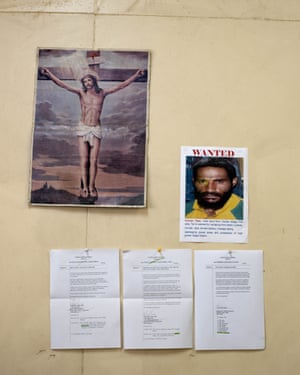Papua New Guinea risking lives with inaction on sexual violence, says MSF
Warning: This is quite an intense article!

Médecins Sans Frontières has warned the government of Papua New Guinea that its inadequate response to sexual violence is putting lives at risk.
In a report, published as MSF prepares to end a nine-year project addressing family and sexual violence, the organisation has called on the country’s leaders and international donors to address dangerous gaps in services and legislation.
“Inadequate or inappropriate responses from the country’s hybrid system of formal and traditional justice, and the dysfunction of the protection system, are putting survivors’ lives and health at risk,” says the report, Return to Abuser.
“Patients’ experiences expose a culture of impunity and a continuing reliance on traditional forms of justice to solve serious family and sexual violence cases.”
Human Rights Watch has called PNG “one of the most dangerous places in the world to be a woman or girl”. About 50-70% of women have experienced family or sexual violence.
MSF has treated almost 28,000 survivors of violence and performed more than 68,800 major and minor surgeries, one third for violence-related injuries.
MSF recorded data from more than 3,000 patients who came to clinics in the capital city of Port Moresby and the Highlands town of Tari over the past two years.
It found 94% of patients treated in the clinic after acts of violence were female, and 56% of sexual violence cases were children. Almost nine out of 10 sexual violence cases at the clinics involved rape.
Sticks, knives, machetes, whips and blunt objects were used in 69% of cases and 26% included death threats. More than a fifth of patients had major injuries.

In Port Moresby, 70% of the clinic’s sexual violence cases were children, of whom 81% were under 15. Of that younger cohort, almost a quarter were under five. The office of the public prosecutor estimates that 55% of sexual violence cases that have reached the courts dealt with the abuse of children.
While much progress has been made by government, grassroots and international organisations, there are gaps.
A lack of safe houses leaves many women with no choice but to return home to their abuser after seeking medical help. PNG has six safe houses, all unregulated, private and unmonitored. Five are in the capital district and four have fewer than five beds.
None will take boys older than seven, which means mothers seeking shelter cannot take older boys.
More refuges are the obvious and urgent priority for the government, said MSF’s head of mission in PNG, Angelika Herb.
“Survivors reach family support centres … but there’s a huge lack of safe havens and survivors are forced to go back to their communities and partners. We are receiving the same survivors back in the family support centre.”
After seven years of review, the government last year passed its Child Welfare (Lukautim Pikinini) Act, which allows for the establishment of safe houses among other child protection measures. But it’s not yet certified and only four of PNG’s 22 provinces have been allocated budgets for the new law.
Since 2007, MSF has opened family support centres and clinics around the country where survivors can access first aid, psychological treatment, HIV and STI medication, vaccinations and emergency contraception.
Control of the family support centres is being transferred to the national health department. But the 16 centres are in urban areas. Around 85% of Papua New Guineans live in rural areas.
MSF has undertaken outreach work in remote communities to educate villagers about gender-based violence and discrimination against women.
Two years after criminalising domestic violence the government is still drafting relevant regulations, and “many officials are unwilling to commit to full implementation without regulations in hand”, said the report.
“Wider acknowledgement of the problem has not always translated into the practical action required to safeguard the lives, health and dignity of survivors of violence.”
The report calls for the government to take action on promised reform, stalled legislation and police training. It wants family support centres strengthened and essential services for sexual violence victims: free healthcare and ambulance services, along with better education, awareness, and transparency programmes.
Sebastian Roberts, the health department’s family and sexual violence coordinator, said coordination between government and external agencies is effective and improving, but intergovernmental cooperation and resources remain challenging.
“The commitment is there in terms of paper, but when it comes to funding we have a problem,” he says.
There have been some gains in the law and justice sector. In the past 12 years, the number of female village court magistrates recruited rose from 10 to 900, and the Australian department of foreign affairs and trade is working in the highlands to support village courts and other local authorities.
Ume Wainetti, national coordinator of the Family and Sexual Violence Action Committee, said there has been great progress but is concerned about what will happen when MSF ends its project.
“We are just fearful that many of these things may be left on the shelf if there is nobody there to make sure they’re being pushed and pulled to do them properly,” she said.
CITATION:
Davidson, Helen. "Papua New Guinea Risking Lives with Inaction on Sexual Violence, Says MSF." The Guardian. Guardian News and Media, 29 Feb. 2016. Web. 01 Mar. 2016. <http://www.theguardian.com/global-development/2016/feb/29/papua-new-guinea-risking-lives-sexual-violence-medecins-sans-frontieres>.
Davidson, Helen. "Papua New Guinea Risking Lives with Inaction on Sexual Violence, Says MSF." The Guardian. Guardian News and Media, 29 Feb. 2016. Web. 01 Mar. 2016. <http://www.theguardian.com/global-development/2016/feb/29/papua-new-guinea-risking-lives-sexual-violence-medecins-sans-frontieres>.
RESPONSE:
There are obvious concerns in Papua New Guinea that when Médecins Sans Frontières ends their nine year project against sexual violence, there will be little progress to protect victims in the future. Helen Davidson, the Australian based author of this article, is aiding MSF to secure the future of victims by calling on the PNG government and foreign aid agencies to take this cause seriously because lives are at risk. Obviously, this is an extreme project to be taken on as Human Rights Watch stated that PNG " is one of the most dangerous places in the world to be a women or a girl". Such a statement highlights the need for action to be taken quickly. Davidson has a biased against the PNG government as she is aware of some progress being made but they need to take the issue of family and sexual violence serious. There is great concern that "many of these things may be left on the shelf if there is nobody there to make sure they’re being pushed and pulled to do them properly." Davidson states that two years ago the government criminalized domestic violence but has been slower to take action. The government officials could be reluctant to take on the job because it is a massive issue in PNG. Davidson addresses that one practical way for the government to begin focusing on would be the protection system. Most of the victims have to return home to potential get hurt again because there are no safe houses set up to protect them. This is an ideal starting point for the government.
No comments:
Post a Comment